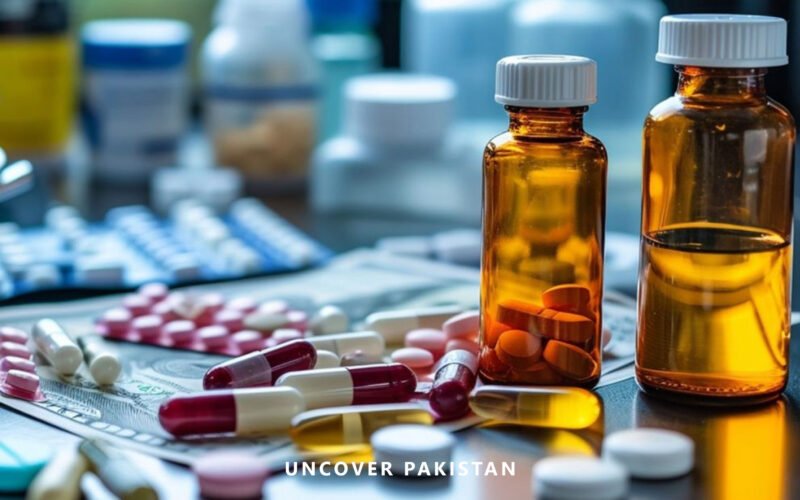Pakistan’s pharmaceutical industry is a rapidly growing sector, with hundreds of medicine companies in Pakistan serving the country’s healthcare needs. In fact, as of 2023 the top 10 pharmaceutical firms account for roughly 48% of the market’s value.
These leading companies include both multinational corporations and homegrown manufacturers, reflecting a mix of global expertise and local innovation. Below is an overview of the top 10 pharmaceutical companies in Pakistan (by market prominence), highlighting their background and contributions to the industry.
Table of Contents
- #1 Getz Pharma (Private) Limited
- #2 GlaxoSmithKline Pakistan (GSK)
- #3 SAMI Pharmaceuticals (Pvt.) Ltd.
- #4 Abbott Laboratories Pakistan Limited
- #5 The Searle Company Limited
- #6 Martin Dow Group
- #7 Hilton Pharma (Private) Limited
- #8 High-Q International
- #9 OBS Pakistan (Private) Limited
- #10 Bosch Pharmaceuticals (Pvt.) Ltd.
- Conclusion
#1 Getz Pharma (Private) Limited
Getz Pharma is the largest pharmaceutical company in Pakistan in terms of domestic sales. Established in 1995, Getz has risen to the top with a strong focus on quality, innovation, and international expansion. Notably, it became the first Pakistani drug maker to have a manufacturing facility pre-qualified and approved by the World Health Organization (WHO). This achievement underscores Getz Pharma’s commitment to meeting global quality standards.
Getz Pharma operates a state-of-the-art production infrastructure and today produces over 300 medicines, exporting to more than 40 countries worldwide. In fact, it has been Pakistan’s top pharmaceutical exporter for well over a decade. The company’s portfolio spans key therapeutic areas such as cardiometabolic diseases, infectious diseases, gastroenterology, and more. In 2022, Getz opened a new ultramodern manufacturing facility (the “Astola” plant), which is the largest pharmaceutical production investment in Pakistan to date and the only LEED Platinum-certified pharma facility in South Asia. With its robust research and development and emphasis on quality, Getz Pharma has set a high benchmark for medicine companies in Pakistan.
#2 GlaxoSmithKline Pakistan (GSK)
GlaxoSmithKline (GSK) Pakistan is the largest multinational pharmaceutical company operating in the country. GSK’s presence in Pakistan dates back over 70 years, and it has been providing trusted medicines and vaccines to millions of patients across the nation. The company’s extensive product range covers anti-infectives, dermatology, respiratory illnesses, pain relief, and vaccines, among others. Many of its brands are household names – for example, Augmentin (an antibiotic), Amoxil (amoxicillin), and Calpol (children’s fever reducer) are some of GSK’s key products in Pakistan.
GSK Pakistan consistently ranks among the top three pharma companies in the country by market share. It holds this position based on both the volume of units sold and the value of its sales. The company operates three manufacturing sites in Karachi, which together produce over 430 million packs of medicine annually. With around 1,700 employees in its manufacturing and commercial operations, GSK has built a significant local footprint. GSK’s longevity and scale in Pakistan, combined with its global R&D-driven approach, have made it a pillar of the Pakistani pharmaceutical industry.
#3 SAMI Pharmaceuticals (Pvt.) Ltd.
SAMI Pharmaceuticals is a leading national company and is currently ranked as the second-largest pharmaceutical manufacturer in Pakistan by sales. Founded in 1976 in Karachi, SAMI has over 40 years of manufacturing experience with a strong reputation for quality and affordability. The company is especially known for its strength in anti-infective drugs – it holds the number one market share in Pakistan for antibiotics and other injectable medicines. This means many hospitals and clinics across the country rely on SAMI’s products for treating infections.
SAMI’s product portfolio is broad, including well-known brands such as Novidat (ciprofloxacin antibiotic), Oxidil (ceftriaxone injection), Kinz (nalbuphine pain reliever), and Trimetabol (appetite stimulant), among others. With an annual turnover of about USD 220 million, SAMI has achieved a scale that puts it in the top tier of Pakistan’s pharma industry. The company also engages in technical collaborations and licensing arrangements with European pharmaceutical firms to bring in new therapies. Recently, SAMI invested in a state-of-the-art facility for producing biotech products like recombinant vaccines, showing its drive to innovate. Overall, SAMI’s focus on high-demand therapeutic areas (especially infectious diseases) and continuous expansion has cemented its status among the top medicine companies in Pakistan.
#4 Abbott Laboratories Pakistan Limited
Abbott Pakistan is the local subsidiary of Abbott Laboratories, a global healthcare company. It began operations in Pakistan as far back as 1948, shortly after the country’s independence. Over the decades, Abbott has steadily expanded its presence and today employs over 1,500 people, with two manufacturing plants in Karachi (at Landhi and Korangi) producing pharmaceutical products. As one of the oldest multinationals in the sector, Abbott has a diverse portfolio that includes pharmaceuticals (especially in areas like diabetes care, cardiology, and gastroenterology), nutritional products (infant formulas and adult nutrition supplements), diagnostic tools, and medical devices. This broad range reflects Abbott’s integrated approach to healthcare.
In Pakistan, Abbott is consistently among the top five pharmaceutical companies by market share. Its long-standing presence has been marked by trusted products such as Brufen (ibuprofen analgesic), Glucerna (nutritional drink for diabetics), and Ensure (nutritional supplement), to name a few. Abbott’s commitment to the local market is also evident from its investment in manufacturing and community health programs over the years. Having operated in the country for over seven decades, Abbott Pakistan has built strong brand recognition and remains a key player in providing quality medicines and health solutions to the Pakistani population.
#5 The Searle Company Limited
The Searle Company Limited is a major Pakistani pharmaceutical firm that has grown through strategic partnerships and acquisitions. Originally incorporated in 1965 as a private company, Searle was initially the local affiliate of the US-based G.D. Searle & Co. (known for products like Pentasa and Lomotil). In the early 1990s, Searle’s Pakistan operations were acquired by the local IBL Group, and it became a publicly listed company on the Pakistan Stock Exchange in 1993. Since then, Searle has significantly expanded its portfolio and market reach. A key strategy for Searle has been forming alliances with multinational pharmaceutical companies. It has long-standing business collaborations with global names such as Organon (Netherlands), Merck & Co. (USA), Schering-Plough, Vifor (Switzerland), and Santen (Japan). Through these partnerships, Searle has been marketing a range of international brands in Pakistan, from women’s health and ophthalmology products to cardiovascular and oncology treatments.
In recent years, Searle took a major step by acquiring OBS Pakistan Ltd., a move aimed at consolidating its market position. OBS was a company that itself represented several multinational portfolios (including products of Merck, Schering-Plough, etc.), so this acquisition boosted Searle’s ranking and therapeutic breadth. Today, The Searle Company is firmly among the top pharmaceutical companies in Pakistan. It manufactures and distributes a wide array of medicines, including both its own formulations and licensed products, and is known for its strong sales network. Searle’s growth story exemplifies how local companies have leveraged international collaborations to become industry leaders.
#6 Martin Dow Group
Martin Dow is one of the largest conglomerates in Pakistan’s pharmaceutical sector, distinguished by its successful acquisitions of multinational portfolios. The group was founded in 1995 by the late M. Jawed Akhai and started as a modest operation, but rapidly scaled up through bold expansion moves. Martin Dow gained industry prominence in 2010 when it acquired the manufacturing facility and product brands of Roche Pakistan, in what was at the time one of the largest pharma acquisitions in the country. This deal brought famous Roche-origin medicines (like the antibiotic Rocephin and anti-anxiety Lexotanil) into Martin Dow’s fold. Then in 2016, Martin Dow made another headline acquisition by taking over Merck Sharp & Dohme’s business in Pakistan. Through this, the company added renowned products such as Concor (a beta-blocker), Glucophage (metformin for diabetes), and Sangobion (an iron supplement) to its portfolio.
As a result of these acquisitions, Martin Dow today produces and markets a wide range of well-known medications, covering both chronic and acute disease areas. The Martin Dow Group now comprises multiple companies – including Martin Dow Limited (the original entity), Martin Dow Marker Ltd (formed after the Merck acquisition), and Martin Dow Speciality – operating collectively under the Martin Dow umbrella. The group has strategic alliances or licensing arrangements with international firms like Roche, Sanofi, and Boehringer Ingelheim, ensuring it continues to introduce new therapies in Pakistan. With an estimated group revenue of around PKR 30 billion as of 2022, Martin Dow ranks among the top few players in the industry. Its growth trajectory showcases how a Pakistani company can successfully integrate global brands and thrive in the local market.
#7 Hilton Pharma (Private) Limited
Hilton Pharma is a well-established national pharmaceutical company, known for its emphasis on research-driven products and strong partnerships. Founded in 1969, Hilton has over 50 years of experience and has consistently remained among Pakistan’s leading pharma firms. One of Hilton Pharma’s distinguishing strategies is that it markets many products under license from more than a dozen world-renowned pharma companies, alongside developing its own branded generic medicines. By collaborating with international research-based companies, Hilton has been able to introduce advanced therapies to the Pakistani market in fields like cardiology, gastroenterology, oncology, and endocrinology.
Since its inception, Hilton Pharma has prioritized quality and innovation, which, combined with clever marketing, has helped its products gain significant positions in their therapeutic categories. The company has also built one of the most extensive distribution networks in Pakistan, reaching over 40,000 pharmacies across the country, which ensures its medicines are widely available. In addition to serving the domestic market, Hilton Pharma has ventured into exports, sending products to regions in Asia and Africa. The company is part of the Progressive Group of Companies and prides itself on adhering to strict cGMP (current Good Manufacturing Practices) standards. With its blend of local insight and international collaborations, Hilton Pharma continues to be a powerhouse in Pakistan’s pharmaceutical landscape.
#8 High-Q International
High-Q International is a fast-growing Pakistani pharmaceutical company that, despite being less of a household name than some older firms, has secured a place among the top ten by market share. The company emerged in 1994 with a vision of addressing Pakistan’s health needs by providing high-quality, affordable medicines. Over the years, High-Q invested in modern manufacturing and built a portfolio spanning various therapeutic areas, from general primary care drugs to specialized treatments. Its rise has been particularly notable in the last decade, reflecting double-digit growth that outpaced many competitors.
High-Q’s success can be attributed to a reputation for “Maximizing Quality” (as its motto suggests) and focusing on widely used medications. It produces a range of generic pharmaceuticals – including antibiotics, pain relievers, and chronic disease medications – which are used in both urban and rural healthcare settings. By ensuring rigorous quality control and efficient distribution, High-Q has gained the trust of healthcare professionals. The company’s ascent also mirrors a broader trend in Pakistan’s market: locally grown medicine companies are capturing larger market shares due to their agility and understanding of local demand. High-Q International’s journey from a modest start in the 1990s to a top-tier pharma company today exemplifies this trend. It continues to expand its capacities and is poised to further strengthen its position in the coming years.
#9 OBS Pakistan (Private) Limited
OBS Pakistan has been a unique player in the pharmaceutical sector, known for bringing multinational products to the local market through licensing deals. Before its recent merger into the Searle group, OBS was recognized among the top 10 pharmaceutical companies in Pakistan for its strong portfolio of imported brands. Essentially, OBS acted as a platform that represented several global pharma companies which had exited or weren’t directly operating in Pakistan. For example, OBS partnered with Organon (a Dutch company specializing in women’s health), Merck & Co. (USA), Schering-Plough, Santen (Japan), and Vifor (Switzerland) to register and market their medicines domestically. Through these partnerships, OBS introduced several innovative drugs to Pakistani patients, ranging from hormonal therapies and ophthalmic solutions to cardiovascular and oncology products, under the original brand names.
This strategy allowed OBS to grow rapidly, as it filled the gap left by multinationals that downsized local operations. The company built a strong sales and distribution team to promote these high-quality products in Pakistan’s private and institutional markets. In 2019, The Searle Company announced it would acquire OBS Pakistan to integrate these international portfolios with Searle’s own business. That acquisition was completed in subsequent years, boosting Searle’s market penetration. While OBS as a standalone entity is now merged, its legacy continues under Searle’s umbrella. The OBS model demonstrated how local firms can successfully collaborate with global companies to ensure Pakistani patients have access to advanced therapies, and it remains an important part of Searle’s growth story.
#10 Bosch Pharmaceuticals (Pvt.) Ltd.
Bosch Pharmaceuticals is one of Pakistan’s fastest-rising pharma companies, distinguished by its focus on manufacturing high-quality antibiotics and other critical care medicines. Founded in 1994, Bosch established itself early on as a specialist in sterile pharmaceutical production. It set up the first plant in Pakistan with three dedicated sterile areas, becoming a pioneer in manufacturing cephalosporin antibiotic injectables domestically. This was a significant milestone in the 1990s when most advanced antibiotics were being imported. By producing them locally, Bosch not only gained a strong market foothold but also contributed to self-sufficiency in life-saving medicines.
Bosch’s growth has been remarkable – by 2022, it was counted as the 7th largest pharmaceutical company in Pakistan. It has also garnered a “vibrant history of export achievements,” being a multiple-time winner of national Export Awards for its performance. Bosch exports medicines to over a dozen countries across Asia, Africa, and showcases the international competitiveness of Pakistani pharma. Today, Bosch Pharmaceuticals continues to invest in expansion (such as setting up a large new penicillin API plant) and maintains its reputation for high-quality antibiotics, while also diversifying into other therapeutic areas. Its trajectory highlights how technological advancement and specialization can propel a company into the top tier of the local industry.
Conclusion
Pakistan’s pharmaceutical industry is a vibrant mix of homegrown innovation and multinational expertise. These top pharmaceutical companies in Pakistan have played a pivotal role in ensuring the availability of quality medicines for millions of people across the country. From producing affordable generics to manufacturing life-saving drugs in specialized fields such as oncology, cardiology, and biotechnology, these companies are meeting both local and global demands. Their adherence to international standards has enabled many to export to more than 50 countries, enhancing Pakistan’s image in the global healthcare market.
Looking ahead, the industry is poised for even greater growth. With advancements in manufacturing technology, increased investment in research and development, and government support through improved regulatory frameworks, these medicine companies in Pakistan can strengthen their foothold both domestically and internationally. The focus on innovation, sustainability, and patient-centred solutions will be the driving force behind shaping the future of pharmaceuticals in Pakistan.
Frequently Asked Questions
Getz Pharma is widely regarded as the leading pharma company in Pakistan. It dominates local market share and has a strong presence in over 25 international markets, making it a benchmark for quality and growth.
Pakistan has more than 700 registered pharmaceutical companies. However, the top 10 control a significant share of the market, ensuring consistent quality and nationwide distribution.
Leading multinationals like GSK, Abbott, Novartis, Pfizer, Bayer, and Sanofi operate in Pakistan. These companies bring advanced technologies and research-driven medicines to the local market.
Yes, many local pharmaceutical companies export to Asia, Africa, the Middle East, and even Europe. Firms like Getz Pharma, Bosch Pharmaceuticals, and Hilton Pharma have strong export footprints.
The Drug Regulatory Authority of Pakistan (DRAP) is responsible for regulating the industry. It ensures compliance with safety, quality, and efficacy standards for all medicines sold in the country.
The pharmaceutical sector faces hurdles like raw material import dependency, price regulations, and currency fluctuations. Addressing these issues is crucial for sustainable industry growth.


